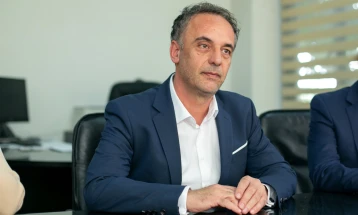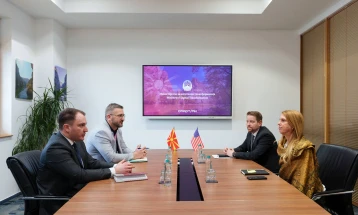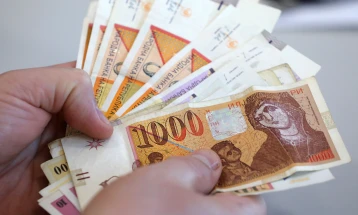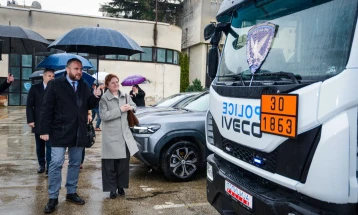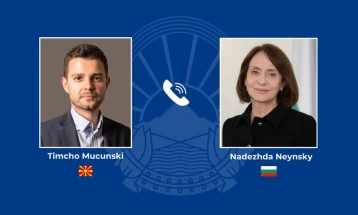Siljanovska-Davkova: We are not a tree without roots, not giving up on ‘natural’ path to EU membership
- We are not a tree without roots. We are not giving up on our natural path toward membership in the European Union because we have always been a part of Europe. We are firmly determined to reach this goal by 2030 – Europeanized in accordance with the Copenhagen criteria, President Gordana Siljanovska-Davkova said in her speech at the central observation of August 2, Republic Day – Ilinden in Krushevo.
- Post By Angel Dimoski
- 16:50, 2 August, 2025

Skopje, 2 August 2025 (MIA) - We are not a tree without roots. We are not giving up on our natural path toward membership in the European Union because we have always been a part of Europe. We are firmly determined to reach this goal by 2030 – Europeanized in accordance with the Copenhagen criteria, President Gordana Siljanovska-Davkova said in her speech Saturday at the central observance of August 2, Republic Day – Ilinden in Krushevo.
In her speech, Siljanovska-Davkova mentioned the Krushevo Manifesto and its fundamental values: “liberty or death, justice, equality, coexistence”. The President said the Ilinden fighters sacrificed themselves for these ideals, obliging all future generations to eternal gratitude. “If we want to invoke the ideals of the Krushevo Manifesto today, as a sovereign, independent, democratic, social country,” she said, “we must dedicate ourselves to the rule of law and fight against endemic corruption”.
“A deep look into the country over the past years and decades reveals endemic corruption and organized crime, weak institutions, strong parties and powerful individuals, extra-institutional decision-making, partocracy as a threat to parliamentary democracy, a partisan and politicized public administration. Unsanctioned responsibility and impunity have destroyed the judiciary, degraded the environment, disrupted interethnic and interpersonal relations, produced disasters and tragedies, encouraged disunity on matters of national interest – where unity must be an imperative,” Siljanovska-Davkova said.

The President also highlighted the mass emigration of young people and those who apply for citizenship from neighboring EU countries which, she said, rouses “nationalist appetites toward us”.
“We mustn’t forget the righteous ideals of those whom we honor and celebrate today. It is time for a new spring of our republic, for a return to our republican roots. What does that mean? The Macedonian citizens expect at least two things from their republic – freedom and justice. When I speak of freedom, I don’t mean only political freedom, but also economic, academic, cultural, social... When I speak of justice, I am not only referring to the judiciary, but also to social, environmental and generational justice. We mustn’t forget that the prerequisites for freedom and justice are the rule of law and equality before the law,” the President stressed.
The President emphasized that no one must remain untouchable in the face of justice, and for that, she said, accelerated and deep reforms in the judiciary are needed.
“If we want to invoke the ideals of the Krushevo Manifesto, we must remain faithful to its fundamental idea that coexistence between different people is built in the presence of justice and freedom. That is why we must uproot the weeds of corruption and crime. No one must remain untouchable, regardless of whether they are a former or current politician or official, judge or influential businessman. For justice to be non-selective and timely, accelerated and deep reforms are needed in the judiciary, and they begin with the European legal framework, but also with European recruitment criteria, and the European standards of operation and accountability,” she stressed.

According to Siljanovska-Davkova, the country needs deep and meaningful reforms in accordance with European standards in every area.
“For that, we strive toward membership in the European Union because it too is the ideological child of Mazzini’s ‘Young Europe’. It is a legitimate question to ask whether and how much today’s European Union, i.e., its highest representatives, are in touch with the ideals of their ideological founders and creators. It seems to me that the ghosts or shadows of old Europe are not a distant past, or that they are reappearing unexpectedly. It has become evident that the EU is not immune to the crisis of leadership and democratic deficit – on the contrary, they are obvious,” Siljanovska-Davkova said.
She also spoke about the challenges on the country’s European path and the “bilateralization” of the accession process.
“Today too, I can note remnants from the old Europe: tired from enlargement, which asks of us to make ‘brave concessions’, while lacking the courage to combat the double standards; a Europe which permits the bilateralization of our integration and tolerates blockades due to issues of identity or history; a Europe which constantly changes the rules of the game at the request of a member state; a Europe which at times tolerates the bypassing of the fundamental values and principles embedded in its foundational documents: The Treaty on the EU, the Lisbon Treaty, the Charter of Fundamental Rights. Although its constitutive acts obligate the Union to respect the European rich cultural and linguistic diversity, national and cultural identity, dignity and integrity, since it proudly defines itself as a unity of diversities, it turns a blind eye to their violation in the interest of unity and peace within,” Siljanovska-Davkova emphasized.

The President said it is strange to hear MEPs dispute the Macedonian identity “a hundred years after the printing of the Abecedar for the Macedonian children in Athens in 1925, under pressure from the League of Nations“. She went on to note that it is “incomprehensible” for the MEPs in the European Parliament, “as a school of European democracy”, to qualify someone as “a young nation and a young country, with a modern language and a modern identity”.
“We are not ashamed of the fact that through our own efforts and after centuries of struggle we achieved statehood in 1944 and peacefully separated from the SFRY (Socialist Federal Republic of Yugoslavia) to gain independence in 1991. On the contrary, our history bears no dark stains for we did not commit repressions, assimilations or deportations. As a small, brave and peace-loving people, we have always stood on the righteous side of history, on the side of freedom, anti-fascism and anti-colonialism. We are not a tree without roots. Our freedom and our republic are rooted in the European spring of nations, in the democratic and humane visions of ‘Young Europe’. And so, to anyone who tells us ‘you are a young nation with a young country’, we will say that we are the children of Goce [Delchev]’s vision of ‘Young Europe’ and of the world as a field for cultural competition between nations,” the President underscored.
President Siljanovska-Davkova said the country should not be discouraged by the obstacles, regardless of how difficult they are, because, she said, “we have endured and overcome more difficult problems too”.

“We are not alone. We have friends – democrats, who respect our right to a national and cultural identity, to a civic dignity and integrity because they themselves enjoy these rights. I believe in their support and assistance. They are not afraid to point out and stand against the double standards and the anachronistic attempts to revise history. We are not giving up on our natural path toward EU membership because we have always been a part of Europe: geographically, historically and culturally – why not politically as well? Simply put, we, the Balkan peoples and nations have been, are, and will continue to be Europeans. We are firmly determined, as was outlined by Europe, to reach this goal by 2030, Europeanized in accordance with the Copenhagen criteria,” Siljanovska-Davkova stressed in her speech.
Photo: Office of the President


